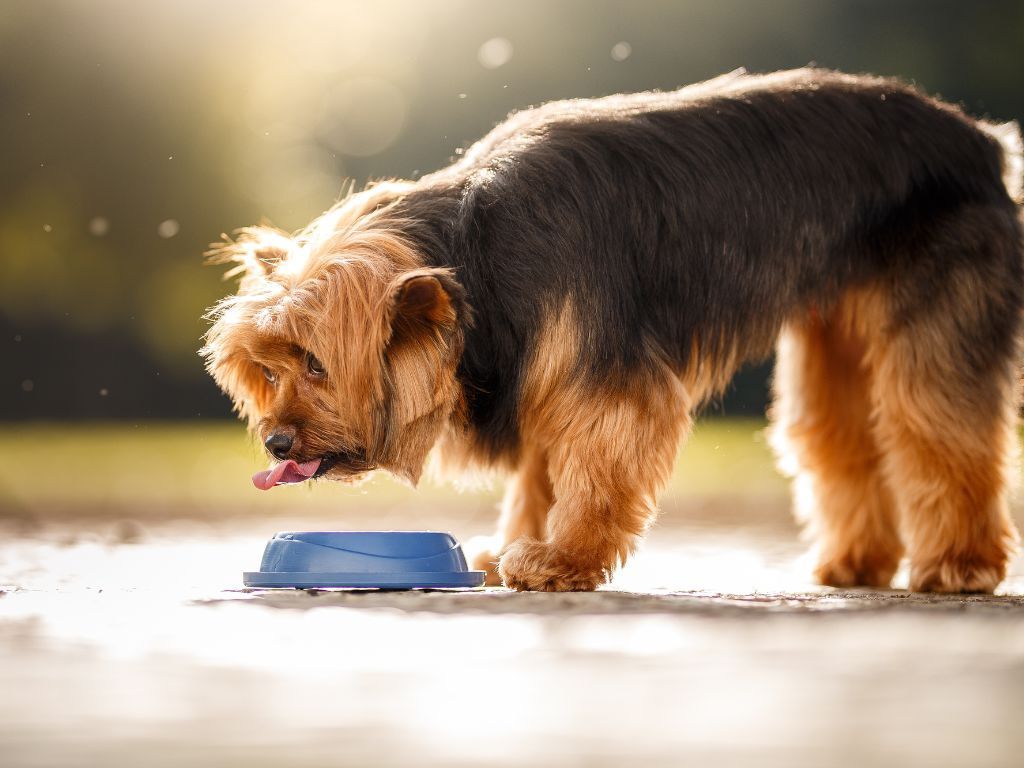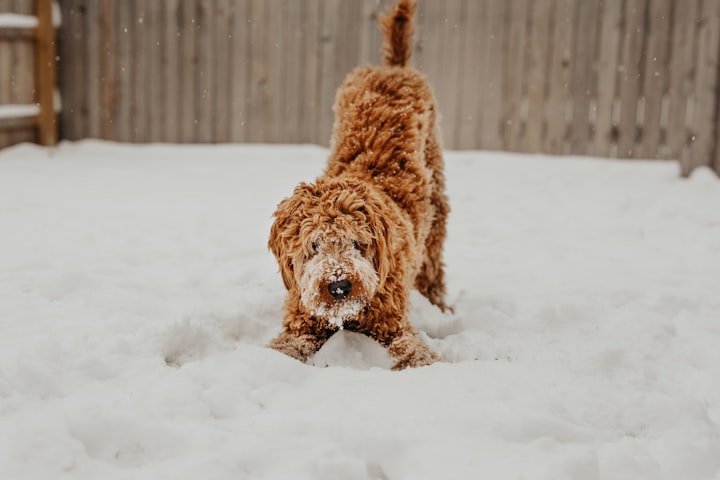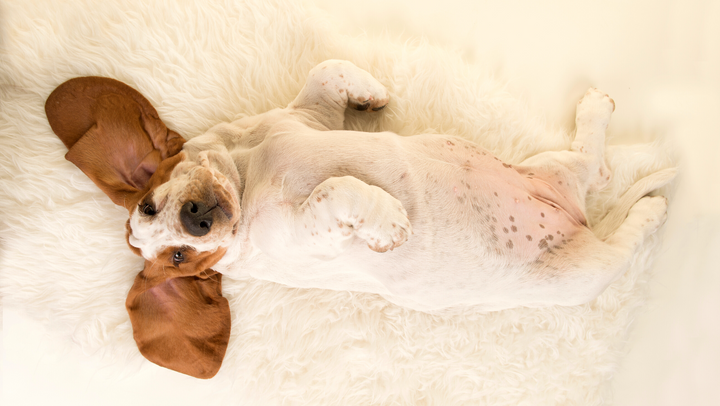Why is My Older Dog Drinking a Lot of Water?

A dog may start drinking more water than usual temporarily due to many factors such as warmer temperatures, physical activity, female dog nursing, some types of food, side effects from medications, etc.
However, pet parents typically find it more concerning when they have a senior pup that has suddenly started drinking lots of water. And while it is true that there are diseases that have an increase in water intake as a symptom, that is not the only reason. Senior dogs may also be more thirsty temporarily. But even if it is due to a medical condition, today there are many treatments available that can help manage your dog's symptoms.
As long as you don’t leave the condition untreated, you can ensure your dog has a comfortable life. That’s why it is important to be aware of other symptoms that could indicate that your senior dog needs a visit to the vet.
In this article, we review what is considered the normal water intake for your dog, and what to look after if you suspect that your dog is drinking water excessively.
Table of Contents
- How much water is too much?
- Why does my dog suddenly want to drink a lot of water?
- When should I be concerned about my dog drinking too much water?
How much water is too much for a dog?
There's no one-size-fits-all answer, but excessive water consumption in dogs may signal health concerns. The guideline is to give your dog 1 ounce of water per pound per day, that is 20 ounces of water for a 20 lb dog, for instance. But this is only a reference, ultimately the pet owner knows best the dogs and they can tell when something is not right.
Here are some tips to keep an eye on your dog’s water consumption:
- Fill the bowl of water to the same level each time
- Refill at approximately the same time every day, preferably early in the morning
- Pay attention to how much water you put in and how much is left at the end of the day
- Pay attention if your dog is peeing more than usual or having accidents at home
Why does my dog suddenly want to drink a lot of water?
If your senior dog suddenly drinks a lot of water, it could be a sign of underlying health issues, and monitoring behavior is crucial. First, check if there have been any changes in the environment, diet, activity levels, or routine. Let’s review some common scenarios that may be contributing to this.

High temperatures
Dogs regulate their body temperature by panting. When they feel warm, they pant more to cool down, but this causes them to lose water, and they will drink more water to replenish their fluids.
Senior dogs are more vulnerable to heat, and we will need to be extra careful with them, especially if you live in warm places and during heatwaves. If you want to keep your senior dog cool, it’s best to avoid letting them outside and keep the proper cool environment for it.
Dehydration
Dogs can suffer from dehydration when their body loses more fluids than they can take in. This condition can be extremely dangerous as water is necessary for many vital body functions, including nutrient absorption, blood circulation, and organ protection, among others.
Dehydration may happen due to vomit, diarrhea, fever, or heatstroke. Senior dogs, puppies, and small dogs are at a higher risk of dehydration.
Food
Think if you have made changes in their diet or perhaps given more treats than usual. Here are some examples of certain foods that can make your dog thirsty:
- Peanut butter
- Liver
- Dry food
- Treats that are high in sodium
- Scraps from the table, which by the way is a bad idea because human food contains salt that in high quantities is toxic for dogs.
Anxiety
An anxious doggie may pant, and as we saw before panting leads to loss of water. So your dog may drink more water to compensate. Other signs of anxiety can include excessive paw licking, shaking, whining, barking, etc.
If you notice your dog is drinking more water at night, it might be a sign of separation anxiety.
Medication side effects
Some medications can cause an increase in thirst and frequent urination. For instance, anti-inflammatory pills, heart medication, anti-seizure drugs, diuretics, and corticosteroids.
What disease makes dogs drink a lot of water?
Diabetes Mellitus
Also known as sugar diabetes. It is caused by the lack of insulin, which means that the cells are unable to use the sugar for energy, and instead, it remains in the bloodstream. When the levels of sugar rise above a certain limit, it spills out into the kidneys and turns into urine.
Nonspay female dogs are also prone to develop this type of diabetes.
The symptoms may include:
- Increased thirst
- Bigger puddles
- Good appetite but weight loss
- Cataracts (appear as a complication of the disease)
- Lack of energy
Cushing’s Disease
It is a condition where the body produces an excess of steroids. This hormone is necessary to help the dog cope with the day to day stresses, but too much leads to a slow decline in the energy levels and body shape.
This condition is common among older dogs but is sometimes dismissed by thinking it is part of old age.
The symptoms may include:
- A pot belly
- Lack of energy
- Increased thirst and appetite
- Fur loss
- Thinning skin
Kidney Failure
The kidney’s active tissue is replaced by scar tissue, making them less efficient over time. When this happens, the kidneys struggle to process and clean the blood from the natural toxins, and eventually, the toxins accumulate in the bloodstream.
The symptoms may include:
- Increased thirst as a mechanism to clean the blood
- Loss of interest in food
- Loss of weight
- Inflamed gums
- Poor coat
- Dehydration
- Vomiting
Cancer
Cancer is a disease caused by the uncontrollable growth of abnormal cells. It affects organs or tissues, causes pain, and spreads to other parts of the body in advanced stages.
The symptoms may include:
- Increased thirst
- Upset stomach
- Coughing
- Loss of energy
- Lumps (irregularly shaped, inflamed, itchy, growing fast)
When should I be concerned about my dog drinking too much water?
Check for other symptoms that might be accompanying excessive thirst, such as vomiting, diarrhea, blood in urine, lethargy, panting, collapse, weakness, or decreased appetite to mention some. If that is your dog’s case, you will be better off by taking your dog to an emergency vet. They can determine if it is a real emergency, and provide guidance.
If your dog is thirsty but otherwise acting normal, keep an eye on them and schedule a regular appointment with your vet. It is important that your dog receive an examination, as we know senior dogs are more vulnerable.
Final thirst
Dogs can temporarily increase their water intake due to changes in temperature, routine, activity, diet, or when recovering from an acute illness. In other cases, increased thirst is an indication of more complex health conditions. But before panicking, it is important to monitor their daily water intake, check for other symptoms, and arrange a visit to the vet. Ultimately is your vet who can give you a proper diagnosis and offer treatments.
References:


![Are Vizslas Aggressive with Dogs & Humans? [Breed Behavior]](/content/images/size/w720/2022/07/dog-5490238_1920.jpg)

Comments ()